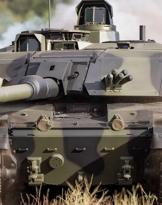The "Protective Edge" operation aimed at stopping rocket attacks from the Gaza Strip shows no sign of abating. The Israeli army continues to issue data that would undoubtedly be classified in other contexts.
In addition to weapons, the one between Israel and Hamas is a media battle to grab international sympathy (and support).
The IDF yesterday destroyed 118 launch sites, six enemy facilities, ten command centers, dozens of storage facilities and twelve tunnels used to transport smuggled supplies from Egypt.
Meanwhile, from the Gaza Strip, missile retaliation is not slowing down. In less than seventy-two hours, 372 rockets were launched against Israel. One every ten minutes, commented by the IDF on the fully operational army's blog.
Israel in response, has mobilized thousands of troops for a possible invasion. What worries the Israeli General Staff the most is the scale of the new Hamas rockets, capable of reaching the city of Hadera for the first time. This means that Hamas is capable of launching missiles sixty miles from Gaza and with five million civilians within reach of rockets.
"Ready for invasion"
The army is ready for the invasion. This was stated by Prime Minister Benjamin Netanyahu on the sidelines of a meeting with his security council.
Hamas will pay a high price for these attacks - added Netanyahu - Israeli security comes first.
But what kind of invasion would it be?
Israel has one of the most powerful armies in the world. The whole country is built to fight, resist and win flash wars, certainly not a conflict of attrition.
The Israeli Air Force (350 fighter planes) has a targeting capacity second only to that of the United States. Tel Aviv also has the most powerful armored force in the Middle East (and almost certainly in Europe) with more than 3400 tanks, a thousand of which are Merkavas. 40 thousand reservists have been recalled while numerous shadow groups act in full enemy territory to signal aviation targets.
To understand even more the military footprint of Israel, another fact would be useful: the ability to triple the number of workers in a few hours from 180 thousand can reach 500 thousand units. In case of total war, 2,5 million, between men and women, would be recalled by the army.
Finally, Israel has nuclear warheads loaded on Dolphin I / II submarines suitably modified to carry out deterrent missions. This massive ultra-technological force has not been structured to invade and maintain positions hundreds of kilometers away. Although technologically superior in every respect, Israel could not fight and resist on all fronts for a simple reason: they would still be too few. Thesis also shared by Israeli secret services.
According to Radio Israel, declared by Intelligence Minister Yuval Steinitz, control of the Gaza Strip is possible, but only for a few weeks, a time that is still necessary to eliminate missile attacks against Israeli cities.
The latest Israeli land offensive dates back to the 2009. Israel and Hamas ceased fire at the end of the 2012. However, according to Hamas, Israel has repeatedly violated the peace treaty, continuing to carry out targeted attacks in the West Bank and openly contesting the new Palestinian government.
 Cities like Tel Aviv and the others south of Israel have been under attack for days with anti-aircraft sirens that have become part of the common life of those who (now habitually) go to shelters.
Cities like Tel Aviv and the others south of Israel have been under attack for days with anti-aircraft sirens that have become part of the common life of those who (now habitually) go to shelters.
At least half of the missiles have been intercepted by the effective and expensive Iron Dome anti-missile system.
The Rafael Iron Dome mobile system, designed for small town defense, is operational from the 2011. Each launcher has twenty missiles. The Iron Dome has the ability to intercept all short-range threats (maximum distance 40 km) in all weather situations. All defense system stations are always manned at all hours of the day and night. Beyond the controversies that have characterized the development of the Iron Dome, mainly linked to its prohibitive cost compared to the Qassam, the interception of enemy missiles continues to demonstrate Israel's ability to respond to multiple threats simultaneously.
Hamas knows it does not have the same strength and power it possessed in the 2012, when it received the support of Egypt ruled by the Muslim Brotherhood.
The new regime, which came up with a coup last year, changed alliances by showing itself hostile to Hamas. After taking control of Gaza from the rival forces of Palestinian President Mahmoud Abbas in the 2007, Hamas retraced its steps and faced international isolation and a devastating economic crisis, last month it agreed to support a new unity government national with his deposed President Abbas.
You must protect us from Israel - said Abbas in a speech addressed to the international community and to the United Nations - you must save our people from this orchestrated and brutal aggression.
The Arab League called for an emergency session of the UN Security Council to stop the violence. And to say that Israel had promised it a few weeks ago, in the midst of searches for the three young students who were later found murdered.
Get them back home - they said several times from the Israeli government - get them back to their mothers or we'll get revenge in our own way.
Hamas (which never claimed the murder but praised the episode) as well as the entire international community, avoided reading between the lines.
As we write to you, the IDF continues to hit targets along the Gaza Strip, while rockets against Israel continue to depart from the Gaza Strip.
Franco Iacch
(photo: Alex Zarfati)












